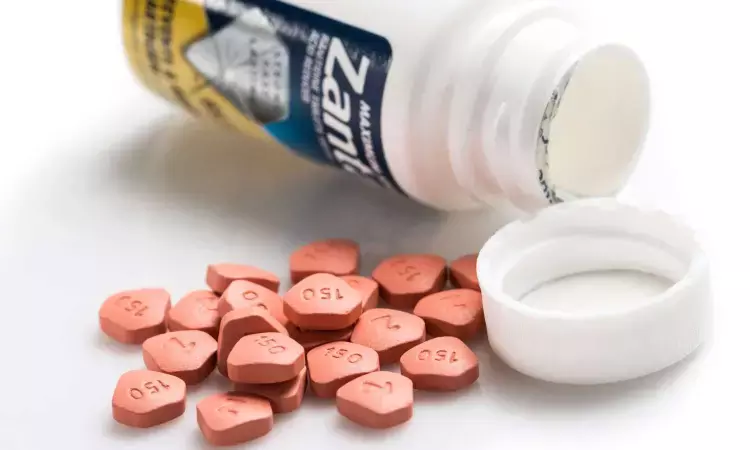- Home
- Medical news & Guidelines
- Anesthesiology
- Cardiology and CTVS
- Critical Care
- Dentistry
- Dermatology
- Diabetes and Endocrinology
- ENT
- Gastroenterology
- Medicine
- Nephrology
- Neurology
- Obstretics-Gynaecology
- Oncology
- Ophthalmology
- Orthopaedics
- Pediatrics-Neonatology
- Psychiatry
- Pulmonology
- Radiology
- Surgery
- Urology
- Laboratory Medicine
- Diet
- Nursing
- Paramedical
- Physiotherapy
- Health news
- Fact Check
- Bone Health Fact Check
- Brain Health Fact Check
- Cancer Related Fact Check
- Child Care Fact Check
- Dental and oral health fact check
- Diabetes and metabolic health fact check
- Diet and Nutrition Fact Check
- Eye and ENT Care Fact Check
- Fitness fact check
- Gut health fact check
- Heart health fact check
- Kidney health fact check
- Medical education fact check
- Men's health fact check
- Respiratory fact check
- Skin and hair care fact check
- Vaccine and Immunization fact check
- Women's health fact check
- AYUSH
- State News
- Andaman and Nicobar Islands
- Andhra Pradesh
- Arunachal Pradesh
- Assam
- Bihar
- Chandigarh
- Chattisgarh
- Dadra and Nagar Haveli
- Daman and Diu
- Delhi
- Goa
- Gujarat
- Haryana
- Himachal Pradesh
- Jammu & Kashmir
- Jharkhand
- Karnataka
- Kerala
- Ladakh
- Lakshadweep
- Madhya Pradesh
- Maharashtra
- Manipur
- Meghalaya
- Mizoram
- Nagaland
- Odisha
- Puducherry
- Punjab
- Rajasthan
- Sikkim
- Tamil Nadu
- Telangana
- Tripura
- Uttar Pradesh
- Uttrakhand
- West Bengal
- Medical Education
- Industry
Sanofi prevails in Zantac arbitration initiated by Boehringer Ingelheim

There is no evidence of consumer harm from real world use of Zantac as a result of any NDMA contamination.
Paris: Sanofi has announced that in an International Chamber of Commerce dispute, the tribunal dismissed BI’s indemnification claim against Sanofi and confirmed that Sanofi shall not be liable to indemnify BI for any potential losses in relation to the ongoing Zantac litigation in the U.S. This decision is final and non-appealable.
"Importantly, Sanofi remains confident that the defense of the underlying U.S. Zantac litigation is very strong," the company stated.
There is no reliable scientific evidence that Zantac causes the alleged injuries in the cases brought against GSK, Pfizer, BI, Sanofi, and others in the U.S. litigation. The FDA and the European Medicines Agency have both evaluated the available data and found no evidence that ranitidine, the active ingredient contained in Zantac, causes cancer.
This was notably confirmed in December 2022, when a U.S. federal court assigned to oversee all federal cases in the United States (“MDL”) ruled that plaintiffs had no reliable scientific evidence that ranitidine can cause any of the plaintiffs’ alleged injuries. The thorough ruling substantiated Sanofi’s scientific defenses demonstrating that there is no reliable evidence of causation for even those cancer types that plaintiffs claimed had the strongest evidence. Sanofi believes that any appeal by plaintiffs of the MDL ruling has a low probability of success. Tens of thousands of claimants who were once a part of this MDL litigation chose to abandon their claims or else withdrew early from the MDL, either filing in state court or not re-filing at all. These recent events have significantly decreased the potential scope of the litigation.
Zantac was launched in the United States as a prescription medication by GSK in 1983 (GSK continued to market the Rx version until 2017). In 1995, GSK launched an OTC version of its Zantac 75mg formula. In 1997, generic ranitidine entered the market. In 1998, Pfizer acquired the OTC rights and in 2004 it launched a 150mg version of the product as well. In 2006, BI acquired the U.S. OTC rights for Zantac and in January 2017 Sanofi acquired those OTC rights.
Since that time, the medical, scientific, and regulatory communities have extensively evaluated the safety of Zantac’s active ingredient ranitidine, and the data show there is no evidence of consumer harm from real-world use of Zantac. Over time, both FDA and the European Medicines Agency have evaluated the available data and have also found no evidence that ranitidine causes cancer.
Regardless of the scientific evidence, within days of FDA’s September 2019 announcement, purported class actions and personal injury lawsuits were filed in U.S. courts, alleging that Zantac caused various cancers. In addition to Sanofi, these lawsuits named GSK, Pfizer, BI, dozens of generic manufacturers, retailers and pharmaceutical distributors.
The arbitration dispute arose from contractual indemnification obligations agreed between Sanofi and BI as part of the January 2017 swap of Sanofi’s Animal Health business for BI’s Consumer Health Care business.
There is no evidence of consumer harm from real-world use of Zantac as a result of any NDMA contamination.
"Sanofi stands by the safety of Zantac. Given the lack of scientific support for plaintiffs’ claims, Sanofi remains fully confident in its defenses to the litigation. Sanofi acted responsibly at all times," Sanofi stated.
Read also: Heartburn drug: Sanofi expects decision on Zantac dispute with Boehringer in Q1 at earliest
Ruchika Sharma joined Medical Dialogue as an Correspondent for the Business Section in 2019. She covers all the updates in the Pharmaceutical field, Policy, Insurance, Business Healthcare, Medical News, Health News, Pharma News, Healthcare and Investment. She has completed her B.Com from Delhi University and then pursued postgraduation in M.Com. She can be contacted at editorial@medicaldialogues.in Contact no. 011-43720751


